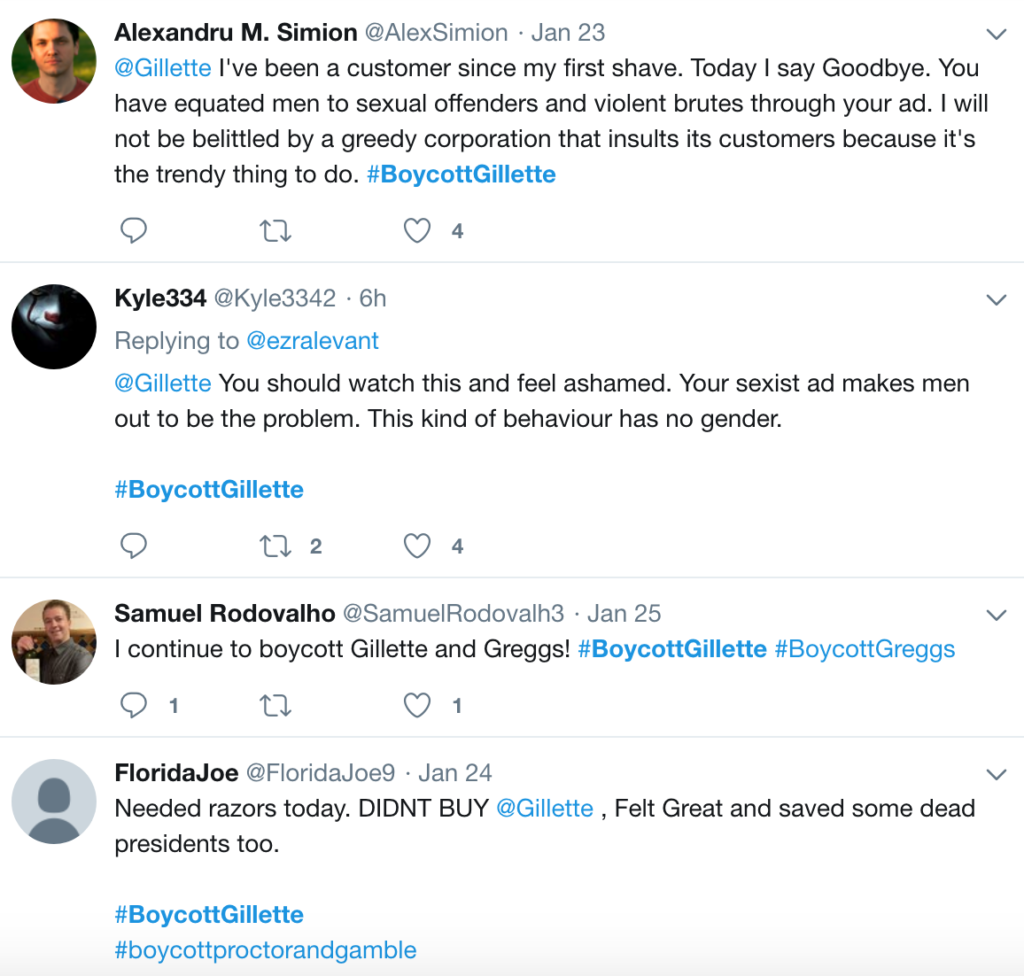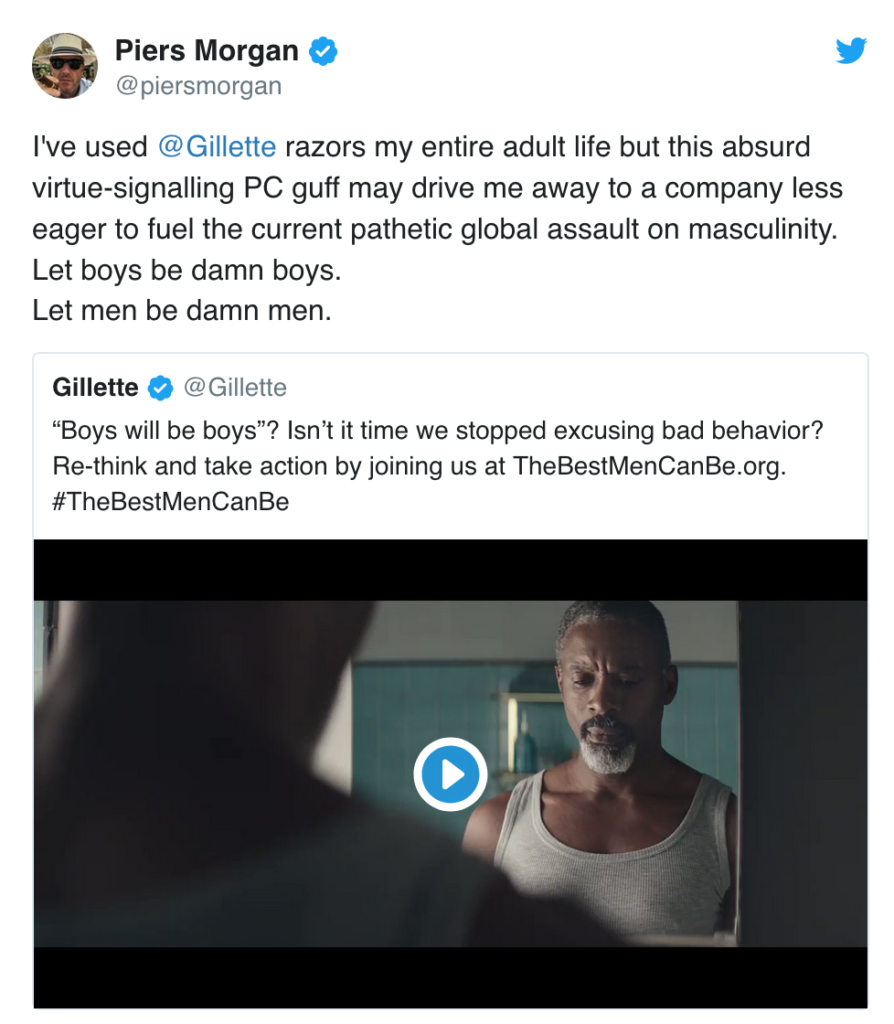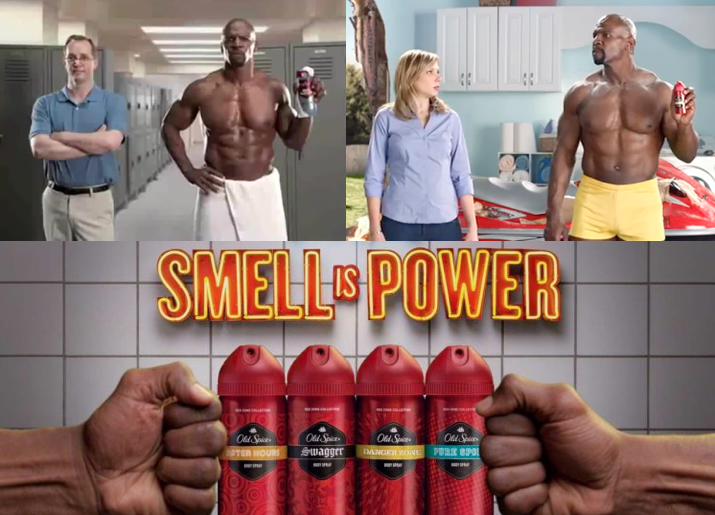I’m going to be honest here, I have wrestled with the new Gillette “The Best Men Can Be” campaign going on for two weeks now. If you haven’t seen Gillette’s recent ad (featured above), then you must have been really busy over the last two weeks. I mean, really busy! Social Media has exploded over the ad since it first aired on January 14, 2019.
As highlighted by Jack Neff at AdAge, Gillette has a new take on masculinity in a campaign that tackles bullying, sexism and the #MeToo movement, laying responsibility on men to overall just be better people. At the beginning of the commercial, a voiceover asks the question with an ironic tone “Is this the best a man can get?” as bullies chase a victim through a screen showing a vintage ad for the razor brand. The new work marks the 30th anniversary of their famous tagline, originally introduced in their 1989 Super Bowl ad.
When I first saw the commercial, I was actually moved by the sentiment that as a society, maybe we were beginning to challenge the abusive, toxic masculine culture that has been obvious in my life of 41 years. Let me expound on this a bit. As a child, I was very athletic. From the day my father placed a basketball in my hands at four years of age, I was dribbling between my legs and behind my back. Literally on that day, my father thanked God for what he knew was in store for the next decade. Every weekend from that day forward was filled with winter basketball games, fall and spring soccer matches, and summer baseball marathons. I was an all-star, especially in basketball. Things were good in my life, until all of the other boys hit puberty. I jest, but I showed up in junior high school wondering why all the other boys had hair under their arms. Needless to say, as an only child, I was way behind the curve both physically and emotionally, unready to deal with the realities that my athletic MVP days might very well be over. The problem was, in my own head, I was still an all-star.
The summer between 6th and 7th grade, we had a basketball camp at my new junior high school. As a rising middle schooler, I was stoked to get on the floor. I had skills and I showed them off, and when the coach praised me for working my butt off at camp, the bigger boys took notice. Now listen, I wish I could sit here and say that I was as brave as Rudy Ruettiger, and I didn’t let these guys affect me, but I can’t. It sucked. Worse yet, my coach at the camp (unbeknownst to him I think) just added fuel to the fire. A man that actually in my mind still today resembled Tony Crews (get to him in a minute), nicknamed me “Smurf.” Yes, I was the smallest kid for my age then, and would continue to be until the summer between 9th and 10th grade when I grew 8-inches in one summer. I grew two inches a month for four months, and yes, it hurt, a lot. The worst part was that now I couldn’t back peddle in basketball without falling down. I didn’t know how to handle that additional height. My coordination wouldn’t come back until my senior year of high-school, and by then, it was way too late. I had just spent the last six years of my life avoiding the bullies that would dominate my private school education. Realistically, it wasn’t that bad. It could have been much worse. I saw much worse. I was just smart enough to stay out of the way and find diversions when needed. But honestly, I can say, to some extent, I know toxic masculinity. In fact, my primary nemesis would go on to murder his wife on Thanksgiving night several years later, and is now in the middle of a 25-year sentence with no parole.
So yeah, like a friend said to me when we watched the commercial for the first time together, “wouldn’t you want your son to be like that, to be the guy who stood against that behavior.” Of course I would, which is why Rudy is one of my all-time favorite movies. He rose against the expectations of his family, of his high school ruffians, even against his high school teachers and coaches who were obviously too consumed in their own lives at the time that they couldn’t realize what negative impacts they were having through their careless lack of mentorship (uh huh, I’m looking at you Coach). So yes, watching this commercial made me happy to be a Gillette consumer. I’ve used their razors for years, and especially loved the innovation that brought a single blade to the back of the razor that allowed for shaving in those tight places. I was a fan of the commercial because it spoke to me on a personal level. I hate toxic masculinity, and I am a male who loves to barbecue and wrestle with my son. His laughter from my tickles brings me sincere joy.
But then came the backlash from other men, tweet upon tweet upon tweet:

Ok, so yeah, I can see these guys’ point too. There are good guys out there who treat women with respect already. They aren’t violent offenders, and they don’t want to be shamed any longer. In talking with several other men around the office, there is a real sense that these men feel our culture is in some way trying to emasculate them. In fact, they even pointed out a site at Askmen.com where there is a Top Ten list of the Worst Male Bashing Ads. As the tweets above indicate, these men are upset with another company telling them how to be a man, and while other brands like Polysporin, Roomba, and Dairy Queen may make fun of them, this was seemingly the last straw from a product that they personally use to help identify as a man. For goodness sakes, facial shaving is a right of passage into manhood and the product that qualifies masculinity is telling them how they should act as a man. Ok, I get it. You have the right to be angry. And amazingly, this is not a left or right issue. Both sides are angry, even Piers Morgan:

As marketing professors, we are provided the authority by way of academia to weigh in on the success, or in this case the lack of success, of ad campaigns. It’s a fun part of the job, no doubt. I believe one of the most insightful critiques has been by a personal colleague of mine, Dr. Charles “Ray” Taylor. I met Ray through one of my closest colleagues, who works with Ray at Villanova University. As a contributor for Forbes Magazine, Ray points out that there are three primary reasons for how Gillette went wrong here:
1) While corporate social responsibility appeals can be effective, corporations must be sensitive to the potential of consumers being skeptical of their motives, or not wanting to be told how to behave by a profit-motivated company.
2) The creative in the “Best a Man Can Be” could be more effective if delivered differently.
3) Politically charged language should be avoided by advertisers.
In other words, toxic masculinity is a politically charged phrase that makes men feel targeted. And while there is a good message in the ad (the one that resonated with me), the creative delivery of that message to a group of men that see themselves as the good guys, you know the guys who most likely buy Gillette razors, was the wrong audience to lecture about toxic masculinity. And finally, as the tweets above also demonstrate, the message came across less than genuine. Consumers are already skeptical of company motives, especially companies that have portrayed certain masculine messages in the past. These men are not stupid. They know Proctor & Gamble own Gillette, which is the same company that owns Old Spice. And yet, the lead spokesperson in the ad, the guy that Gillette puts forward to say “Men need to hold other men accountable,” is none other than Terry Crews. Really? You mean this guy:

This is who men should aspire to be: Terry Crews, the infamous Smell the Power of Old Spice guy. There is not a better example to use? This is the man that solicited “Power” for Old Spice through the masculine scents of After Hours, Swagger, Danger Zone, and Pure Sport. Each one of these scents “wreaks” of toxic masculinity. Come on P&G, you can’t deny that this is a tough pill to swallow. Not to mention, just three years ago, Gillette released this ad:
As Brian Millar of Fast Company alludes, if you didn’t see the phallic symbolism that would make Sigmund Freud choke on his cigar, then you really need to go back and watch that video again. This is exactly why Gillette’s new ad didn’t connect to its audience. Just a short time ago, Gillette was making masculine jokes. They were sitting with other men, these men, their customers, telling the dirty joke in the locker room while their customers used Gillette’s razor to shave his face, his very own reflection of masculinity. And now, that dude (Gillette), who was his bro, toking a cigar and telling him dirty jokes wants to criticize him for being overtly masculine. As Twitter would indicate, these men are saying “No.” Not just no, but “Hell no!” Even Piers Morgan has had enough. Because ironically enough, this older commercial about their customer’s first “real” girlfriend, Sara, was closer to Gillette’s brand story than the current one.
You see, this is exactly what my co-author and I have been debating in our new theory, The Social Media Magnet. Companies like Gillette are often their own worst enemies. In our theoretical discourse, we discuss the importance of staying true to your brand story. There are two different types of situations that can cause a company to move off of their brand story. Either one, they move into an acquisition phase where they are focusing more on new customers rather than retaining their loyal ones, letting them slip right out the back door. Or two, they move into a hunkered down position of fortification, focusing only on protecting their current territory and retaining current customers, forgetting to acquire new consumers or new markets. Our contention is that companies must maintain a balance at both ends, while focusing on brand story consistency throughout. It is definitely a delicate balance, but one that can be strategically managed as long as you stick to the brand story. When you stray off brand in either attempt, this is where you can find yourself in the fire storm.
In this case, I would maintain that in an effort to reach a millennial audience that appreciates corporate social responsibility, and in an effort to push out the mail order competitors in this market segment, like Dollar Shave Club and Harry’s (who coincidentally had their own masculinity commercial first), Gillette strayed from their brand story. The “Best a Man Can Get” is personal. It’s about THE man, and what he can acquire to reaffirm his masculinity. The “Best Men Can Be” moves the message off of the materialistic desires of that man, and puts the burden of his desires directly onto the shoulders of others. If not for his actions, what would the world be? By the telling reactions of the #BoycottGillette movement, I would say that Gillette was much further off their original brand story than they expected.
In the Social Media Magnet course, we consistently tell our students: “Keep the main thing, the main thing.” We reinforce brand story over and over. If you don’t know what your brand story is, then someone else will write it for you. As my friend Ray Taylor insinuated, if only Gillette had stayed in line with their brand story, then this campaign could have been very effective, but as it is now, only time will tell if this may go down as one of the top all-time marketing blunders.
Feel free to weigh in in the comments section below. I would love to hear your opinions.
-Dr. Kyle A. Huggins
If you are a college professor curious about The Social Media Magnet, check our professor overview with highlights of our features and benefits. If you would be interested in considering The Social Media Magnet for your university, we have a professor preview function that would allow you to see and work with some of the content. Or if you just have some general questions, feel free to contact us. We would love to assist you however possible.

I read the attached Gillette article. Excellently laid out in your piece! The thought – one of many – that remains LOUDEST of all others regarding this: How dare Gillette preach to me about how to be a man! Had Gillette/P&G consulted with you two prior to the campaign – since the article laid out MANY sound points – the ad may have been constructed as such so Gillette would NOT come across with such a “How dare you act this way?!”-finger-pointing, you’re-just-a-“toxic male” approach. Due to a number of other virtue-signaling messages out there, Gillette missed the (what I consider) BETTER point of suggesting we look long and hard at our own version/vision of how we, individually, make ourselves better men, and if we’ve done such in ALL endeavors. Watching how I conduct myself – courtesy of both parents – remains vitally important, irrespective of the situation at hand. The other virtue-signaling messages? Instead of promoting dialogue/discussion, they come across as though we’re being yelled at/down to for not agreeing – carte blanche – with the messengers and/or those who’ve constructed the messages. VERY condescending, and dissuades us from even wanting to listen those who shout/yell/preach/accuse.
I’m okay with the ad honestly. I get that part of the message contradicts a past theme, but times in society are changing constantly. I think any ad will get criticism in today’s world especially because social media is so accessible now. I also think the aim towards women is a real thing, but not sure if sales would go down or up.
@socialmediamagnet I agree with your friend, Ray Taylor: if only Gillette had stayed in line with their brand story, then this campaign could have been very effective. I think @Gillette needs to re-do the ad to get the desired outcome that I hope they were wanting in the first place.